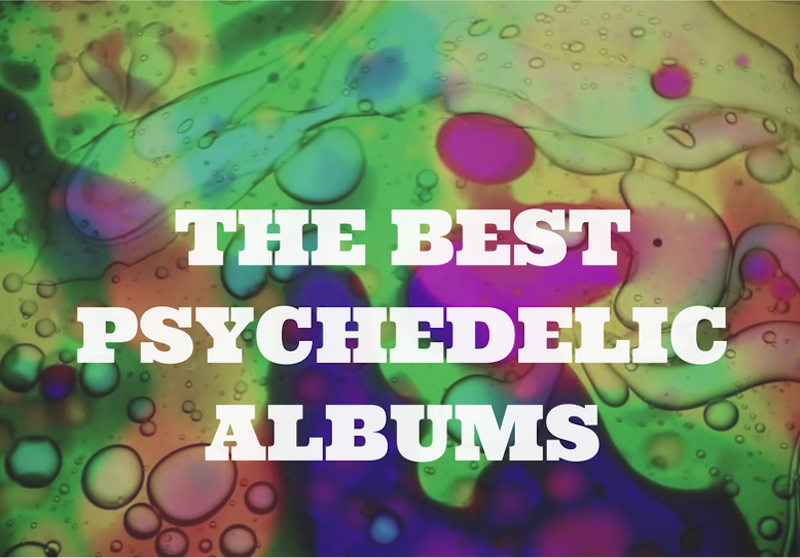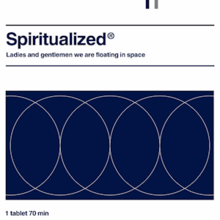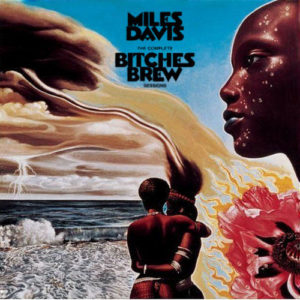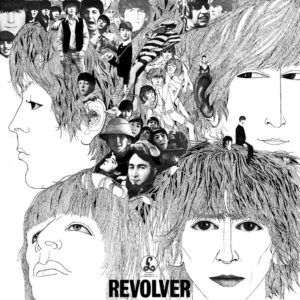Treble’s Top 50 Psychedelic Albums

 10. Pink Floyd – Piper At the Gates of Dawn
10. Pink Floyd – Piper At the Gates of Dawn
(1967; EMI)
The ultimate “method” psychedelic album, Piper At the Gates of Dawn was the one glistening, full-length high of Syd Barrett’s pre-decline years. By the moment of its release in August 1967, Pink Floyd had become the darlings of the British underground press, with their performances at the UFO Club taking on a borderline mythical status. What hit stores, however, was something entirely different. A pulverizing, visionary studio concoction, it endeavored not to replicate the stage version of Pink Floyd, but to seek a new musical representation of the hallucinogenic experience. What resulted was at times sweetly appealing, at others eye-wateringly alienating, perhaps the best encapsulation of the dichotomy at the heart of a true psychedelic experience. “Flaming” and “Bike” are tracks to play to the whole family, but nine and a half minutes of “Interstellar Overdrive” is a somewhat different story, a necessarily disruptive, unsettling, challenging listen. The fact that this version of the band shone as briefly as they did might have been inevitable, but that they got so bright is solely testament to the talent of the four men in question. – Max Pilley
 9. Love – Forever Changes
9. Love – Forever Changes
(1967; Elektra)
On the back cover of Love’s third album Forever Changes, the Los Angeles band’s frontman Arthur Lee can be seen holding a broken flower pot in a statement that wasn’t just countercultural but counter to the prevailing counterculture. The Summer of Love was a sham, in other words, and only a band with a name as brazen as Love could be the ones to darken the hippies’ doorstep. Love certainly had a darker side—the band literally spent a time living in Bela Lugosi’s mansion, which is goth as fuck—and that heavy mood permeates their masterpiece, Forever Changes. Sunshine and flowers are in short supply here, and in their place are tubs filled with blood, nursery rhymes about incarceration and indictments of white American authority figures. Forever Changes is often a beautiful album (“Maybe the People Would Be the Times or Between Clark and Hilldale,” “The Good Humor Man He Sees Everything Like This”), and it’s often a trip into hazy guitar freakouts (“A House Is Not A Motel,” “Live And Let Live”), but at no point is it the hedonistic love-in as supposedly promised in 1967. – Jeff Terich
 8. Flaming Lips – The Soft Bulletin
8. Flaming Lips – The Soft Bulletin
(1999; Warner Bros.)
Galactic in its sheer weightiness, yet unbelievably tender and playful, The Soft Bulletin heralded a significant evolution for The Flaming Lips as artists. It’s not just one of the greatest psychedelic albums, but one of the greatest albums of all time. From the gravity-well cathartic choruses of “A Spoonful Weighs a Ton” to the melancholy kaleidoscope of “Waiting for Superman,” to the elation of “What is the Light,” it’s an album that represents a worthy and mature examination of optimism, of serenity and promise amid a stellar sense of wonder. The psychedelic textures of The Soft Bulletin, though by no means the first of their kind, defined the sheer weirdness of the Flaming Lips’ catalog. It’s still vibrant, shaky and acid-drenched, of course. “The Spiderbite Song” brims with a chorus of extensive voices, while a piano accents a soundscape that oscillates and flows, as if part of its own stream of consciousness. But this album is carefully managed, composed and constructed. It’s a dreamy, baroque opera, and it’s completely magical. – Brian Roesler
 7. Spiritualized – Ladies and Gentlemen We Are Floating In Space
7. Spiritualized – Ladies and Gentlemen We Are Floating In Space
(1997; Dedicated)
From the muffled opening announcement, “ladies and gentlemen, we are floating space,” Spiritualized mastermind Jason Pierce opens the gates to his strange, spaced-out world of Ladies and Gentlemen We Are Floating in Space. All seem to be welcome, but only those who dare brave this chaotic and alien terrain. Ladies and Gentlemen is a dark, seismic wave of lushly layered and textured sounds. It’s also a prime example of a transcendentalist-like record: When the rest of the world is moving in one direction, whether that’s physically or audibly, Pierce decided to take his own route. The end result was unlike anything before it. The true beauty of Ladies and Gentlemen is its timeless essence. It could have just as easily been recorded a decade prior or two decades after. If we were to ever send more music into space, it should be this album. It captures life and its movement, otherworldly yet oddly human. From the twinkling-to-explosive “All of My Thoughts,” to the highly underrated closer, “Cop Shoot Cop,” a collection of sounds of this caliber has yet to be recreated, or even touched. – Timothy Michalik
 6. Zombies – Odessey and Oracle
6. Zombies – Odessey and Oracle
(1968; CBS)
Lost in the mania of the late ‘60s, the Zombies’ sophomore album was a well-mannered affair that took considerable care of its compositions more than anything else. Forced into brief recording sessions at Abbey Road, the Zombies didn’t have much room to trip out on typical psychedelic touches of the time, save for John Lennon’s Mellotron that he’d left in the studio. But Odessey [sic] and Oracle is almost perfect: modestly ornamented with Colin Blumstone’s vocal melancholy and Rod Argent’s flowing piano and keyboard lines. (Side note: This is also one of the greatest piano albums of the classic rock era, up there with Born to Run, Warren Zevon and Goodbye Yellow Brick Road.) “A Rose for Emily” and “This Will Be Our Year” have an almost unbearable emotional force, as does the party’s-actually-over vibe of their last hit, “Time of the Season.” It may have been too genteel even for the narcotically subdued in its time, but Odessey and Oracle’s elegance and flow have amplified in stature in the 50 years since its release. – Paul Pearson
 5. Beach Boys – SMiLE
5. Beach Boys – SMiLE
(1967; Capitol [released in 2011])
The story of SMiLE can’t be told in a cramped space. Brian Wilson, fresh off the industry-changing Pet Sounds and the meticulously produced “Good Vibrations” single, took what seemed like a manic leap forward but may have been a logical progression. Along with lyricist Van Dyke Parks—rock music’s last link to pre-rock traditions—Wilson composed what he called “a teenager’s symphony to God.” SMiLE was an ambling, brave record that veered between thick vocal harmonies, Wilson’s perfect musical sense, and non-sequiturs that both dramatized and mocked the operatic approach. SMiLE’s narrative never had a literal reality outside Wilson’s brain (or Parks’, who already lived to subvert everything he worked on). Wilson obsessively worked on elements of SMiLE way past its deadline of January 1, 1967; the rest of the group, uncertain where to wedge themselves in, pretty much let Wilson go on his way. After Capitol Records had teased fans with the impending release of SMiLE for months on end, the sessions were canceled, temporary band publicist Derek Taylor said the tapes had been destroyed, and a wan replacement album Smiley Smile eventually appeared in its place. The whole of SMiLE was vacated until Brian Wilson finally released a brilliant remake of its original running order in 2004 with the L.A. band The Wondermints. Finally, the 1967 album was issued as part of a box set in 2011, and rock’s most notorious “lost” album finally arrived. Mike Love hated SMiLE, which should be a ringing endorsement for it. – Paul Pearson
 4. Miles Davis – Bitches Brew
4. Miles Davis – Bitches Brew
(1970; Columbia)
The front cover of Bitches Brew, in addition to depicting clouds melting into an embracing African couple and the face of (presumably) some kind of deity, reads: “Directions in Music by Miles Davis.” That single line speaks volumes about the album, not just because it squares with Davis’ own exasperated quip to a congressman’s wife about changing the shape of music about five or six times, but because it says so much about the experience that Bitches Brew provides. Featuring up to this point of his career some of the longest compositions Davis had released—if one could conceivably call everything here “composed”—Bitches Brew is the sound of exploration, of taking risks and seeing where they end up instead of allowing theory or principle to dictate. Much of what can be heard on the album is unprecedented: Multiple bass players and drummers performing at once, sections of music edited and spliced into entirely different sections, and long, slow crescendos that operate more like raga than jazz. That and for a jazz record, it rocks pretty fucking hard. Whether or not drugs had a specific influence on the album, the psychedelic experience it provides is the more important thing here. It’s an otherworldly two hours of music that exists on a plane of its own. All the directions one needs will be provided by the music itself. – Jeff Terich
 3. Can – Tago Mago
3. Can – Tago Mago
(1971; United Artists)
Ultimately, a good dissociative warble will mark something as psychedelic, but it’s the relation to rhythm that really drives it home. A free-floating a time asynchronous fuzzy guitar line can make us leave our earthly bodies, but so too can a grounded and funky groove if it dives deep enough. Can may not be the greatest krautrock group of all time and Tago Mago may not be their indisputable best, but for a keen and undeniable example of how a deep-pocket funky groove can rewire the brain and body to dream of things beyond the limits of the self, one need go no further. Many words have been said about their famed improvisational vocalist Damo Suzuki, but the real star here is the unimpeachable rhythm section. With grooves this primal and deep, anybody could sound good over them. – Langdon Hickman
 2. The Beatles – Revolver
2. The Beatles – Revolver
(1966; Apple)
For those still naive enough to think that Sgt. Pepper’s Lonely Hearts Club Band was the tipping point for The Beatles’ promotion of mind-altering substances, let this 1972 John Lennon quote disabuse of that notion: “Rubber Soul was the pot album and Revolver was the acid.” The former album was the, ahem, gateway drug, along with songs of the period like “Day Tripper” hinting at the Fab Four’s already long embrace of recreational usage. Revolver, on the other hand, was essentially the grand opening of a head shop of sound. The riffs in “Taxman,” the guest musicians on “Love You To,” and the lyrics of “Tomorrow Never Knows” reference the band’s search for transcendence in Indian and other East Asian sources. “Got to Get You Into My Life” and “Doctor Robert” are literal tributes to their plants and chemicals of choice. And everywhere else, they chronicle the perils and pleasures of what might be experienced with every dose: paranoid isolation, childlike reverie, muddied self-expression, emotional connection. It’s a complex and unpredictable album. Your results may vary. – Adam Blyweiss
 1. Funkadelic – Maggot Brain
1. Funkadelic – Maggot Brain
(1970; Westbound)
It started with an LSD trip. During a recording session, George Clinton told Eddie Hazel he wanted him to imagine he was informed his mother had died only to be later told that wasn’t true. Only a request as madcap, disquieting, and ingenious could be ground zero for Maggot Brain. Who knows what other instructions Funkadelic were armed with when they crafted the demigod king of all things psychedelia.
Another old adage: What have white people stolen from Black culture? Everything but the struggle. Multiple that by a thousand when it comes to music. It wasn’t George Martin or Timothy Leary who cracked open the wellspring of psychedelic music. No, that person would be none other than Jimi Hendrix. Hendrix’s brilliance led to an influx of fellow African-American musicians picking up where he left off, and no one grabbed that baton and ran with it as far as George Clinton. Hendrix’s influence can be heard on the furious “Super Stupid,” a junkie tribute that shreds as hard as any hard rock at the time. But then there’s the funk, the black rhythms of “You and Your Folks, Me and My Folks.” There’s the astral trip of all trips found on the album’s title track and of course “Can You Get to That” unlocking the majesty of pop melody to boundless success.
Maggot Brain is a drug trip, an evocation of black soul, an honest-to-goodness face-melting freak out, but most importantly it’s an immortal collection of seven tracks that would serve as a style bible for the future of psychedelic music. – Wesley Whitacre

 10. Pink Floyd – Piper At the Gates of Dawn
10. Pink Floyd – Piper At the Gates of Dawn 9. Love –
9. Love –  8. Flaming Lips –
8. Flaming Lips –  7. Spiritualized –
7. Spiritualized –  6. Zombies –
6. Zombies –  5. Beach Boys –
5. Beach Boys –  4. Miles Davis – Bitches Brew
4. Miles Davis – Bitches Brew 3. Can –
3. Can –  2. The Beatles –
2. The Beatles –  1. Funkadelic – Maggot Brain
1. Funkadelic – Maggot Brain
If Piper at the Gates of Dawn isn’t (by far) the most psyched out album then I’m Syd Barrett.
Great list – and refreshingly broad for a list of this type. Kudos to the compilers (and I hope you’re all still talking to each other.)
Anyhow, I’d like to add an album that should, IMO, be here: The Rain Parade, Emergency Third Rail Power Trip, Enigma Records, 1983.
The Rain Parade were a band prominent in LA’s Paisley Underground scene in the early 80s. It featured both of the Roebuck brothers, David and Steve, as well as Matt Piucci, Will Glenn, and Eddie Kalwa. Dave Roebuck would go on to form Mazzy Star with Hope Sandoval, while the rest of the musicians interchanged in various bands and studio sessions.
Emergency Third Rail Power Trip is true psychedelia throughout with nary a weak song or deviation from form.
I’m so glad you commented. I too certainly noticed Rain Parade’s glaring absence.. _Emergency Third Rail Power Trip_ & _Explosions In The Glass Palace” two-fer CD is pretty damn essential imo. Anyway, good on ya, mate!
Too broad
This is possibly the worst Best Psychedelic Albums List I’ve ever seen on the internet. Are you kidding me? Kid A, Foxtrot, Fragile, Fear of Music, & Animals? All of those albums I named are not Psych. Maybe you should listen to more Psychedelic music because you clearly don’t have much of an idea of what it really is. Just because something has an experimental edge doesn’t make it Psychedelic. By that logic, you could call The Gorillaz Psychedelic. Psych has more of a surreal edge, both musically, and usually lyrically as well. You should retitle this list, Best Psychedelic albums for Hipsters, and Anthony Fantno fanboys.
to say jimi started psychedelica ignores prior works by groups like jefferson airplane and 13th floor elevator, both significant predates hendrix
Totally agreed! Also, these people seem to not have a clear understanding of what Psychedelic music really is. Since they put Animals, Foxtrot, Fragile, The Fear of Music, and Kid A on here. Because those albums are not Psychedelic whatsoever.
We did this addendum that might be more to your liking.
https://www.treblezine.com/10-more-of-the-best-psychedelic-albums/
Part of the fun of making this list was the idea that “psychedelic” is sort of open to interpretation. And all of those albums have psychedelic elements. Maybe they’re not “psychedelic rock” in the strictest terms, but it was fun to see where this went.
I agree with this sentiment. My buddy and I used to have a little radio show that focused solely on psychedelic music, and our picks were all over the place. Red Crayola–>Philip Jeck–>Alva Noto–>Pretty Things–>Porter Ricks would be a typical lineup. Like you said, the fun was considering each album and designating (or not) it “psychedelic.” You can make a case for a lot of albums, and it’s not just about reverb or flanging.
So glad to see Funkadelic get the love it deserves. I feel like they are overlooked a lot. Too many of these lists leave out Maggot Brain!
no discharge?
Never really thought of Discharge as psychedelic, tbh.
Mr. Pooper.
13th floor elevators at #35? And no Easter Everywhere? You understand that these are major oversights on a list of the best psychedelic music. They should be top 5.
Even the most knowledgeable and sophisticated selection is fraught with false historicity and misleads, but with all due respect for the effort this is more a list of psychedelic influenced music, not the the core of the genre it was intended to represent (which would obviously include 13th Floor Elevators, Pink Floyd. The Beatles). Another glaring omission, though a latecomer with the ‘progressive’ label: Nektar: A Tab In The Ocean (1972). Special mention to the hit & miss Electric Prunes (I Had Too much to Dream 1966), The Amboy Dukes (Migration 1969), The Chocolate Watchband (No Way Out- Dark Side of the Mushroom 1967). Though the influence of the original Psychedelic Movement that came out of drug inspired garage bands of the mid to late 60’s extends far beyond, particularly the resurgent tributes in the 80’s, it’s just a progressive imitation to me that lacks the ‘cutting edge’ of yesteryear. Let the foundation of the genre move on into synth and stop trying to re-imagine what was already done better in the past. It’s mind bending not tickling. Hypnotic not just good vibrations. It takes you somewhere else with or without drugs.
Just stumbled across this list, top work. Suppose there’s a difference between capital-P “Psych” as a genre and “pyschedelic music”. Very bold choice sticking Maggot Brain at number one – solidly top ten for me – and Revolver is wildly overrated in general, but if you can’t have a bit of a moan at this kind if lists then what’s the point? Would have BoC much higher up, the Alice Coltrane is sublime as well, very good shout indeed. Always found Joy Division to be in the “psychedelic music” world as well, something about the intense locked in thing, very Can-like. No Funhouse is a big miss as well. Put this list up there with the Spin 100 guitarists one which I think caused some actual seizures and was all the better for it.
Interesting list.
The No.1 psych-album is missing: Tame Impala – Innerspeaker.
Not mentioning The Doors is a crime.
Have a beautiful day!